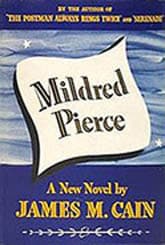Mildred Pierce
Critique • Quotes • At the movies
 First edition
First editionFirst publication
1941
Literary form
Novel
Genres
Literary, psychological thriller
Writing language
English
Author's country
United States
Length
Approx. 98,000 words
Daughter dearest
If your exposure to James M. Cain was his popular short novels, like The Postman Always Rings Twice or Double Indemnity and their movies, or if it came via the 1945 Joan Crawford film adaptation of this book, you may be pleasantly surprised by the original Mildred Pierce.
Although those other books and movies are terrific in their ways, the novel Mildred Pierce is quite different. It's not at all the noirish, violent and amoral story you might expect, despite almost every description of it as such.
This idea of Mildred Pierce as fitting into that era's hardboiled mould, the genre Cain was perceived as writing in, goes back to the early days of the its publication. The New York Times Book Review judged Mildred Pierce thusly:
If there are more vicious quarrels in print than those in which these characters indulge their sadism I have not seen them.... it has in it the deep, slow pull of the ancient ooze where worms and serpents crawled; it reflects no codes, no restrictions, and none but the primordial necessities. It is a bath in sensation.
Robert van Gelder
Even current reviewers and blurb-writers seem to see the novel through that smoky lens.
American mythology
In reality, though, the darkness in Cain's Mildred Pierce is only in one particular character's heart. The seaminess of life is presented alongside the uplifting. And the violence is almost entirely emotional. It may surprise you further that gunfire plays no role in the novel's social interaction—especially if you've seen the movie that turns Mildred Pierce into a murder mystery. No one even dies in the book, except from illness.
Little in Mildred Pierce, the novel, justifies approaching it through the genre of Hammett, Chandler and other Cain works. Rather, we should view it as one of the great stories of the modern American mythology in the tradition of Theodore Dreiser, Sinclair Lewis, and even Scott Fitzgerald. It's a story of overweening dreams and stunted emotion, in which the central figure reaches the heights of success, as dictated by social norms, but is brought down by her personal flaws.
Mildred's most obvious flaw of course is her obsession with pleasing her elder daughter, the mother's repeated attempts to buy Veda's love driving Mildred's push for material success. The girl, not to put too fine a point on it, is a conniving, supercilious bitch.
One criticism of the novel may be that the mother's compulsion is never explained—no reader thinks he or she would be fooled by the daughter as Mildred is. But Cain does drop hints as to the mother's psychology: there are ample suggestions that Mildred herself feels superior to people who have to work for a living, that she herself is conflicted over having to work in a restaurant to support her family, that she is pricked by Veda's barbs about her middle-class existence because she has suppressed a similar desperation within her own breast. Her daughter's haughty ways represent her own yearnings that on her own she may have overcome.
But Cain doesn't spell this out. Unlike in The Great Gatsby, whose titular figure's quest to buy love is shown through third-party eyes as pathetically misguided, in Mildred Pierce we get the picture mainly through her perspective and we have to piece together the real motivations.
Nor are we aided by the subsidiary characters being presented fairly and realistically. Even the men who let Mildred Pierce down are human beings, none more so than her dim ex-husband Bert, whose affair with another woman has broken up his marriage but who continues to be as good a father as he can. And he turns out to be the one person Mildred can rely on for support through her troubles.
The other two men in her life, Wally and Monty, are less supportive in the long run but they are never shown as evil. They're just guys out for their own interests, willing to help out when it coincides with their own agendas, but ultimately they're the men they've been moulded into by their respective positions in society: the business wheeler-dealer and the pleasure-seeking aristocrat. Similar assessments could be made of Mildred's less prominent female supporters.
Keeping our bearings
Mildred Pierce is not a perfect novel. There are too many jumps ahead—Mildred too easily going from baking pies to becoming a wealthy restaurateur with a chain bearing her name, Veda suddenly becoming an operatic singing sensation. And sometimes you just want to grab the characters and slap them for acting so idiotically.
But that's part of what makes the novel stay with you so long after you've read it. Isn't that a reaction you sometimes have to your own friends or to figures you follow in the news?
In noir or hardboiled fiction, good and bad are often inverted, with the reader being led to identify with dubious characters, but typically in the end a moralistic retribution is delivered, often based on a code of honour that supersedes our corrupted societal norms.
Mildred Pierce does not so easily fall into this category. Beneath the personal narrative runs a stream of criticism against the society that creates the characters we meet and the situations that set their interests against each other. But as readers we keep our bearings, even as the characters lose theirs. Absolute good and absolute bad are irrelevant. It's just a question of how we can get along with each other, to derive from each other what we all need, without creating winners and victims. Without driving each other crazy.
And without the law or threat of jail or guns or some outlaw code imposing its solutions.
Tricky. Like Mildred Pierce.
— Eric
Critique • Quotes • At the movies

